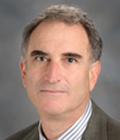- Balancing Stress of Anesthesia and Work-Life Frenzy: Mastering Mindfulness to Find Compassion and Resilience at Work!
- Monday, 1:10-4:10 p.m.
- McCormick Place West, W182

Kenneth Sapire, M.B., Ch.B.
Stress and burnout are threats to all health care professionals, who increasingly are exploring different avenues to cope with those issues. A Monday workshop will look at the benefits of mindfulness that a growing number of medical professionals use to deal with challenges in work and life.
“Balancing Stress of Anesthesia and Work-Life Frenzy: Mastering Mindfulness to Find Compassion and Resilience at Work!” will examine the physical and emotional effects of stress and feature two professionals experienced in teaching unique techniques to deal with stress in life and at work.
“If you read about the demographics of stress and burnout, 50 percent of physicians at any given time may have experienced burnout. Burnout is defined as emotional exhaustion, depersonalization and lack of personal accomplishment,” said Kenneth Sapire, M.B., Ch.B., session moderator. “Mindfulness is awareness that arises through paying attention, in the present moment, non-judgmentally. It’s about knowing what is on your mind. We will use simple techniques such as meditation, guided imagery and some other special activities in our workshop to illustrate the point and value of this work.”
Dr. Sapire, a Professor in the Department of Anesthesiology and Perioperative Medicine at the University of Texas MD Anderson Cancer Center, Houston, said he realized in 2009 that he was not happy enough in his medical practice. His reaction was to study the science of mindfulness, which includes numerous scientific articles and studies.
That research led Dr. Sapire to a mindfulness lecture by Jon Kabat-Zinn, who has done groundbreaking work in stress reduction, and The Healer’s Art, a course developed by Rachel Naomi Remen, M.D., about medical professionalism and humanism taught at more than 70 U.S. medical schools.
“Her program looks at dealing with service as a way of life, how to deal with grief and loss, and the awe of medicine,” Dr. Sapire said. “It makes you think about what it would be like to be fully engaged with yourself and the practice of medicine. There is an endemic amount of stress in our medical community. We need to know how to integrate this into our work-life activities.”
During the education session, Dr. Sapire will examine the physiology of stress and burnout and discuss weingology, which is the science of studying well-being. He also will address the role of anesthesiologists as leaders in practice.
The other speakers are Joel Levey, Ph.D., and Michelle Levey, M.A., founders of the International Center for Corporate Culture and Organizational Health at InnerWork Technologies, Seattle. They work with organizations and cultures to expand compassion and creativity at work and in life.
“They have an interesting way of teaching. We look forward to open discussion, and active participation is encouraged,” Dr. Sapire said. “The session may briefly break into small groups for participants to engage directly with the teaching. The Leveys, who have taught this workshop for the last four years at the annual meeting, teach around the world, run blogs and websites, and are excellent at what they do.”
Return to Archive Index